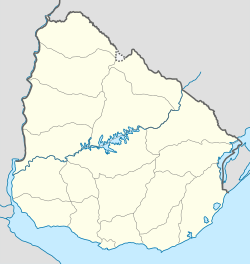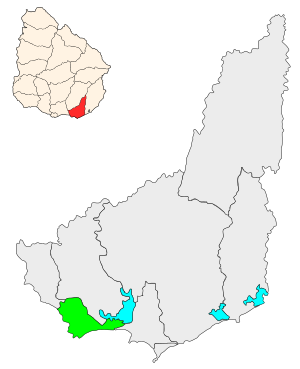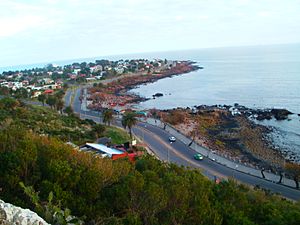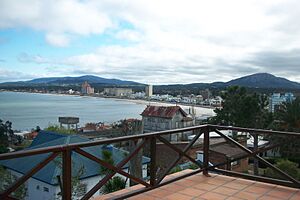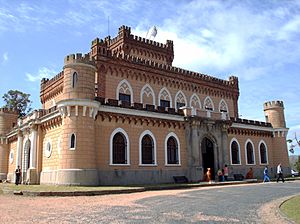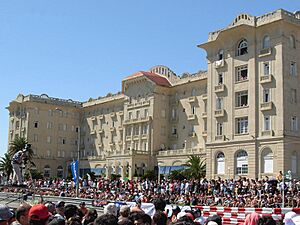Piriápolis facts for kids
Quick facts for kids
Piriápolis
|
|
|---|---|
|
City & Municipality
|
|
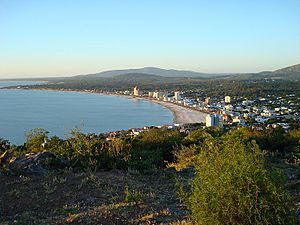 |
|
| Country | |
| Department | |
| Founded | 1890 |
| Founded by | Francisco Piria |
| Area | |
| • Total | 25 km2 (10 sq mi) |
| Population
(2011 Census)
|
|
| • Total | 8,830 |
| Time zone | UTC -3 |
| Postal code |
20200
|
| Dial plan | +598 443 (+5 digits) |
| Climate | Cfa |
Piriápolis is a city in the Maldonado Department of Uruguay. It's a popular summer vacation spot in the country, even older than the famous Punta del Este. Many people visit Piriápolis for holidays, so it has fewer people living there all year round compared to other cities its size.
The name Piriápolis also refers to the larger area around the city. This area includes several other beaches and towns like Playa Hermosa and Ocean Park.
Contents
Where is Piriápolis?
Piriápolis is located right on the coast of the Río de la Plata (River Plate). It's about 100 kilometers (62 miles) east of Montevideo, the capital city of Uruguay. You can reach it by following Route 10 and Route 37.
The Story of Piriápolis
Piriápolis was founded on November 5, 1890. It was first called El Balneario del Porvenir, which means "The Resort of the Future."
The Vision of Francisco Piria
The city was created by a businessman named Francisco Piria. In 1890, he bought a huge piece of land. This land included hills like Cerro Pan de Azúcar and Cerro del Toro, stretching all the way to the beach.
Piria had big plans for his new resort. He built many important buildings that are still famous today:
- In 1897, he finished his own home, known as Piria´s Castle.
- In 1905, he built the "Hotel Piriápolis." Today, it's used as a school holiday camp.
- From 1910 to 1916, he constructed the beautiful coastal road called Rambla de los Argentinos.
- Between 1920 and 1930, he built the Argentino Hotel. It was one of the largest hotels in South America at that time.
Becoming a City
After Piria passed away in 1933, his family had disagreements about his property. Over time, Piriápolis continued to grow.
On September 10, 1937, Piriápolis officially became a "Pueblo" (village). Later, on June 21, 1960, it was given the higher status of "Ciudad" (city).
How Many People Live Here?
In 2011, Piriápolis had 8,830 people living there permanently. There were also 8,489 homes. The wider area of Piriápolis, including nearby towns, has about 14,000 residents.
Here's how the population has grown over the years:
| Year | Population | Dwellings |
|---|---|---|
| 1963 | 4,546 | 2,620 |
| 1975 | 5,240 | 3,661 |
| 1985 | 5,878 | 4,289 |
| 1996 | 7,570 | 5,640 |
| 2004 | 7,899 | 7,123 |
| 2011 | 8,830 | 8,489 |
Source: Instituto Nacional de Estadística de Uruguay
Fun Places to Visit
Piriápolis is a great place for tourists! The city's main area is the Rambla de los Argentinos, a beautiful walkway along the waterfront.
Hotels and Entertainment
Since tourism is very important here, Piriápolis has many fancy hotels. You can also find large casinos and a lively nightlife scene. There are also public parks to enjoy.
Amazing Views
You can take a chair lift up to the Templo de San Antonio. This temple is on top of one of the hills surrounding the city. From there, you get an amazing view of the coast and the city below.
Outdoor Adventures
For those who love adventure, Cerro Pan de Azúcar is about 10 kilometers (6 miles) outside of town. It's Uruguay's third-highest point and offers a challenging climb. There's also a nature reserve nearby.
At the Piriápolis port, you can go on boat tours or try saltwater fishing.
Historic Buildings
The Castle of Piria, built by the city's founder, is open to the public. It's a fascinating place to explore. The famous poet Julio Herrera y Reissig even lived there for a while.
Places of Worship
- Parish Church of the Immaculate Conception and St. John Vianney (Roman Catholic)
Piriápolis in Stories
- The Uruguayan film Whisky has some scenes set in Piriápolis.
- Juan Grompone's mystery novel Asesinato en el hotel de baños (Murder in the Bath Hotel) takes place in Piriápolis.
See also
 In Spanish: Piriápolis para niños
In Spanish: Piriápolis para niños
 | Madam C. J. Walker |
 | Janet Emerson Bashen |
 | Annie Turnbo Malone |
 | Maggie L. Walker |


